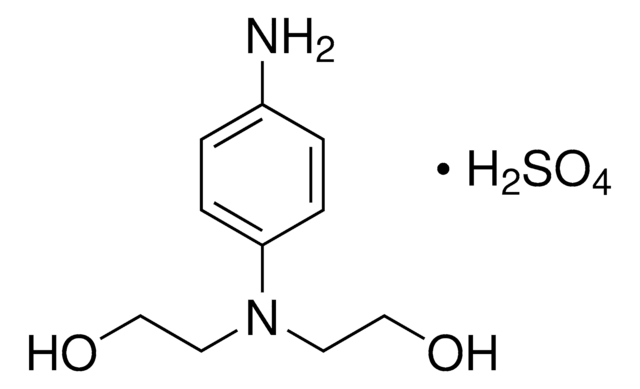95321
Hydrogen peroxide solution
≥30%, for trace analysis
About This Item
Recommended Products
grade
for inorganic trace analysis
for trace analysis
Quality Level
vapor pressure
23.3 mmHg ( 30 °C)
Assay
≥30% (titration)
form
solution
shelf life
~4 yr
concentration
≥30%
impurities
≤2 mg/kg total nitrogen (N)
density
1.11 g/mL at 20 °C
anion traces
bromide (Br-): ≤0.05 mg/kg
chloride (Cl-): ≤0.05 mg/kg
fluoride (F-): ≤1 mg/kg
nitrate (NO3-): ≤0.5 mg/kg
phosphate (PO43-): ≤0.1 mg/kg
sulfate (SO42-): ≤0.1 mg/kg
cation traces
Ag: ≤0.5 μg/kg
Al: ≤1 μg/kg
As: ≤1 μg/kg
Au: ≤1 μg/kg
B: ≤1 μg/kg
Ba: ≤0.5 μg/kg
Be: ≤0.5 μg/kg
Bi: ≤0.5 μg/kg
Ca: ≤10 μg/kg
Cd: ≤0.5 μg/kg
Co: ≤0.5 μg/kg
Cr: ≤0.5 μg/kg
Cs: ≤0.5 μg/kg
Cu: ≤0.5 μg/kg
Fe: ≤5 μg/kg
Ga: ≤0.5 μg/kg
Ge: ≤0.5 μg/kg
Hg: ≤1 μg/kg
In: ≤0.5 μg/kg
Ir: ≤0.5 μg/kg
K: ≤5 μg/kg
Li: ≤0.5 μg/kg
Mg: ≤1 μg/kg
Mn: ≤0.5 μg/kg
Mo: ≤0.5 μg/kg
Na: ≤5 μg/kg
Ni: ≤0.5 μg/kg
Os: ≤0.5 μg/kg
Pb: ≤0.5 μg/kg
Pd: ≤0.5 μg/kg
Pt: ≤0.5 μg/kg
Rb: ≤0.5 μg/kg
Rh: ≤0.5 μg/kg
Ru: ≤0.5 μg/kg
Sb: ≤0.5 μg/kg
Se: ≤1 μg/kg
Sn: ≤0.5 μg/kg
Sr: ≤0.5 μg/kg
Ti: ≤1 μg/kg
Tl: ≤0.5 μg/kg
U: ≤0.5 μg/kg
V: ≤0.5 μg/kg
Zn: ≤1 μg/kg
Zr: ≤0.5 μg/kg
SMILES string
OO
storage temp.
2-8°C
InChI
1S/H2O2/c1-2/h1-2H
InChI key
MHAJPDPJQMAIIY-UHFFFAOYSA-N
Looking for similar products? Visit Product Comparison Guide
Application
Signal Word
Danger
Hazard Statements
Precautionary Statements
Hazard Classifications
Aquatic Chronic 3 - Eye Dam. 1
Storage Class Code
5.1B - Oxidizing hazardous materials
WGK
WGK 1
Flash Point(F)
Not applicable
Flash Point(C)
Not applicable
Personal Protective Equipment
Choose from one of the most recent versions:
Already Own This Product?
Find documentation for the products that you have recently purchased in the Document Library.
Customers Also Viewed
Our team of scientists has experience in all areas of research including Life Science, Material Science, Chemical Synthesis, Chromatography, Analytical and many others.
Contact Technical Service

